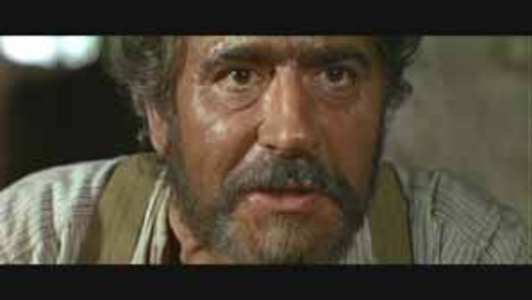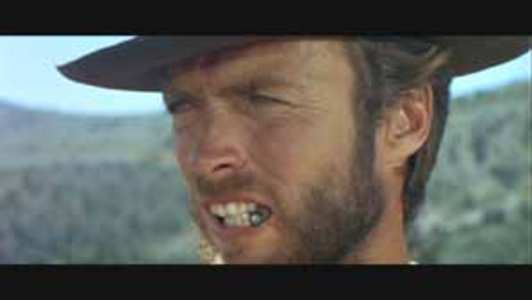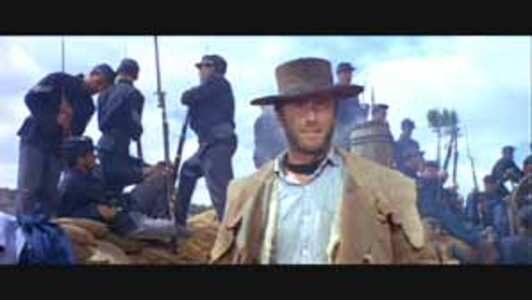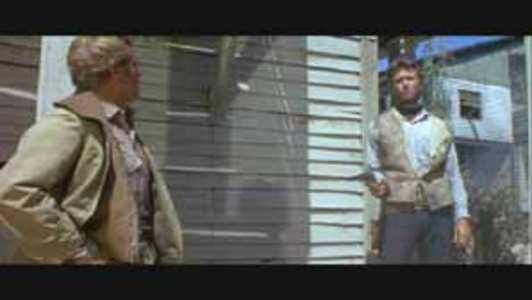Review of Good, The Bad and The Ugly, The
Introduction
The Good The Bad and The Ugly is the third and final film in the Serge Leone trilogy of so called ‘Spaghetti Westerns’ due to them being shot in Europe. The film can be described as a classic, and this trilogy was the springboard that launched Clint Eastwood’s movie career, following on from ‘A Fistful of Dollars’ and ‘For A Few Dollars More’.
Eli Wallach and Lee Van Cleef ably assist Clint in this film. Eastwood, somewhat predictably, is the ‘Good’ recreating his role as the poncho wearing ‘man with no name’. Cleef (who also starred in For A Few Dollars More) is Angel Eyes the ‘Bad’ and Wallach the ‘Ugly’.
Wallach plays Tuco, who partners with Eastwood (nicknamed ‘Blondie’ by Tuco). Tuco is a wanted man and a reward is offered for his capture alive (so he can be hung!). At the gallows, the plan is for Blondie to shoot the rope in half just after Tuco is left hanging. Then they run for it having collected the reward money, only to perform the same scam in another town. However the pair dislike each other, and it is Tuco who is reliant on Blondie to cut the rope each time and so argues for more than half the bounty. In the desert they come across a runaway wagon with a few dead soldiers in. One is still alive and whispers to Tuco that there is $200,000 treasure hidden in a particular graveyard. Tuco knows the graveyard, but only Blondie is told which grave to look in, and thus Tuco knows he cannot dissolve the partnership just yet.
The rest of the movie focuses on the treasure hunt during the backdrop of the Civil War, with Angel Eyes trying to muscle in and take the loot from both Tuco and Blondie.

Video
This is the best produced DVD of all the three MGM classics, and is the only one that benefited from an anamorphic transfer. Why they didn’t apply the same treatment to all three of the films is beyond me, but there have been rumours circulating that MGM are to re-release the trilogy again, this time with full anamorphic treatment.
The image is incredibly sharp throughout and anamorphic compatible display equipment will bring out the best of the film. I reviewed this DVD on Reviewer’s Sharp XV-C20E LCD projector, which is not anamorphic compatible, however I am keen to view it again on our anamorphic Davis Cinema One DLP unit which will no doubt be a tremendous experience. Widescreen TV owners will also know the joys of a decent anamorphic transfer.
The video has been restored, and a great job has been done here. There are very few scratches or dust specs visible, and for a 35 year old movie this is a major achievement. Viewers just need to look at the trailer to get an idea of how the non restored version must have looked!
Colours are deep and vivid – most noticed during the opening credits where the screen is predominantly red. Contrast is also very nice, with deep blacks that do not hide detail.

Audio
The audio has been restored, but we still have a Dolby Digital Mono soundtrack. It would have been perfect if the soundtrack had been remixed into 5.1, as had been done with the Region 1 release of The Towering Inferno, but no such luck.
However the soundtrack’s best feature is the wonderful score by Ennio Morricone, whose theme to the film produced a number one hit single. Brash and loud at times, is one of the most memorable film soundtracks in history, and is a powerful feature of these three films. It no doubt set the standard for many Westerns to follow.
Of course, once again this film is dubbed into English, most of the actors speaking their native Italian during shooting. However the dubbing is not as bad as the first movie, and it does not really distract.

Features
You get the trailer, and 14 minutes of restored footage.
These scenes are still in the native Italian, as the English dubbing had not been done to them. These sequences have never been seen in the US versions of the film, and are a worthwhile extra of special value to avid fans of these films. These scenes are English subtitled.

Conclusion
This movie is my personal favourite of the three, and it is also the best presented DVD too.
These films have a look and feel all to themselves. Serge Leone created a ground breaking style for Westerns with his use of wide panoramic landscape shots, often several seconds of total silence on the soundtrack, and dramatic close up shots with loud striking audio chords.
Some may say these films are often very slow in parts, but this is a misconception. By today’s standards, this may be the impression, but these films were made in the mid 60s, and set a new standard at that time. Many of these scenes are character developing or necessary for scene setting, and thus are an integral part of the whole movie experience.
Although over two and a half hours in length, it is compelling viewing. The plot is quite involved and there are effectively two different story lines here. An entertaining romp it certainly is, and the story is more detailed than the first two movies.
The characters are very well developed – Tuco is tense and hyper all the way through the film, which contrasts with Blondie’s easy going, calm nature. Angel Eyes is different again, in that he is just thoroughly evil!
This DVD has to be recommended for its sheer entertainment value and quality of the transfer. Lets hope MGM sort out the other two films and so we will end up with decent anamorphic versions of all three, perhaps in a new box set.
Your Opinions and Comments
Be the first to post a comment!